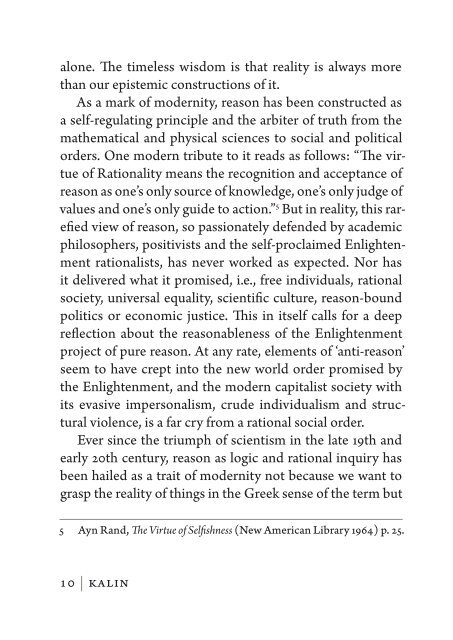Dr Ibrahim Kalin - The Royal Islamic Strategic Studies Centre
Dr Ibrahim Kalin - The Royal Islamic Strategic Studies Centre
Dr Ibrahim Kalin - The Royal Islamic Strategic Studies Centre
You also want an ePaper? Increase the reach of your titles
YUMPU automatically turns print PDFs into web optimized ePapers that Google loves.
alone. <strong>The</strong> timeless wisdom is that reality is always more<br />
than our epistemic constructions of it.<br />
As a mark of modernity, reason has been constructed as<br />
a self-regulating principle and the arbiter of truth from the<br />
mathematical and physical sciences to social and political<br />
orders. One modern tribute to it reads as follows: “<strong>The</strong> virtue<br />
of Rationality means the recognition and acceptance of<br />
reason as one’s only source of knowledge, one’s only judge of<br />
values and one’s only guide to action.” 5 But in reality, this rarefied<br />
view of reason, so passionately defended by academic<br />
philosophers, positivists and the self-proclaimed Enlightenment<br />
rationalists, has never worked as expected. Nor has<br />
it delivered what it promised, i.e., free individuals, rational<br />
society, universal equality, scientific culture, reason-bound<br />
politics or economic justice. This in itself calls for a deep<br />
reflection about the reasonableness of the Enlightenment<br />
project of pure reason. At any rate, elements of ‘anti-reason’<br />
seem to have crept into the new world order promised by<br />
the Enlightenment, and the modern capitalist society with<br />
its evasive impersonalism, crude individualism and structural<br />
violence, is a far cry from a rational social order.<br />
Ever since the triumph of scientism in the late 19th and<br />
early 20th century, reason as logic and rational inquiry has<br />
been hailed as a trait of modernity not because we want to<br />
grasp the reality of things in the Greek sense of the term but<br />
5 Ayn Rand, <strong>The</strong> Virtue of Selfishness (New American Library 1964) p. 25.<br />
10 | <strong>Kalin</strong>















